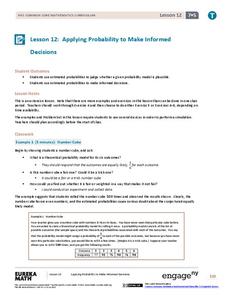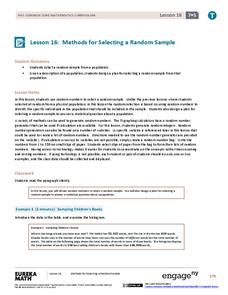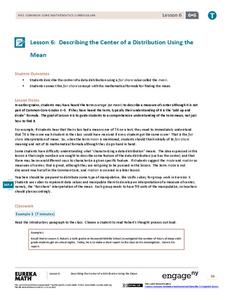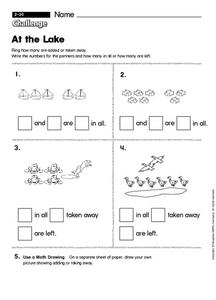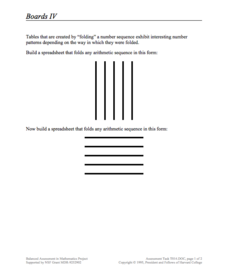Virginia Department of Education
Properties of Quadrilaterals
What type of quadrilateral is that? Discover the difference between the types of quadrilaterals. Small groups investigate types of quadrilaterals using geometry software to find their properties. To keep track of the different...
EngageNY
Modeling from a Sequence
Building upon previous knowledge of sequences, collaborative pairs analyze sequences to determine the type and to make predictions of future terms. The exercises build through arithmetic and geometric sequences before introducing...
EngageNY
Using Sample Data to Compare the Means of Two or More Populations II
The 23rd segment in a series of 25 presents random samples from two populations to determine whether there is a difference. Groups determine whether they believe there is a difference between the two populations and later use an...
EngageNY
Applying Probability to Make Informed Decisions
Use simulations to determine the probabilities of events to make decisions. Class members are presented with several scenarios, some with known probabilities and others without. Groups run simulations to gather data that they then...
EngageNY
Methods for Selecting a Random Sample
Random sampling is as easy as choosing numbers. Teams use random numbers to create a sample of book lengths from a population of 150 books. The groups continue by developing a technique to create samples to compare from two populations...
EngageNY
Using Sample Data to Compare the Means of Two or More Populations
Determine whether there is a difference between two grades. Teams generate random samples of two grade levels of individuals. Groups use the mean absolute deviation to determine whether there is a meaningful difference between the...
EngageNY
Finding a Rate by Dividing Two Quantities
Develop the right station to solve rate word problems. The 18th instructional activity in a series of 29 starts by interpreting the aspects of rates with two different quantities. Pupils use the interpretation of rates to solve problems,...
EngageNY
The Opposite of a Number's Opposite
It's said that opposites attract, but what about opposites of opposites? Individuals learn about the opposite of opposites using number lines. They complete a group activity in which members determine the opposite of opposites of...
EngageNY
Describing the Center of a Distribution Using the Mean
Everyone does their fair share. The sixth segment in a 22-part unit presents the mean as a fair share. Groups build a conceptual understanding of the mean of a data set, rather than simply learn an algorithm. Learners use the...
Curriculum Corner
Learning Fun with Hershey Bars
Compiled of 18 task cards and five worksheets, young mathemmaticians practice solving fraction word problems and other fraction-based activities with a Hershey Bar. The packet comes with sheets to record and keep track of all of the task...
Curated OER
Simplifying Rational Expressions
In this algebra worksheet, students simplify rational expressions using common denominators. There are 50 questions requiring factoring and grouping, with an answer key.
Curated OER
Factoring Polynomials
In this Algebra II/college level worksheet, students use the discriminate to determine if a polynomial has factors with integral coefficients and factor polynomials, including factoring by pulling out the GCF and factoring by grouping....
Curriculum Corner
Winter Multiplication and Division Problem Solving Task Cards
A set of 18 winter-themed multiplication and division word problems is perfect for your math centers right before the holidays. Each problem is numbered and represented on a task card. Young mathematicians write their answers on a...
Pearson
End of Year Practice Test (Grade 8 Math)
This is a great resource to keep daily material aligned to standardized assessments. It offers complete multiple choice and short-answer practice with a wealth of opportunities for customization. Offer it as a whole,...
Curated OER
At the Lake
In this addition and subtraction worksheet, students write the numbers in the boxes to show the number sentence for each problem and write how many are there are in total or how many are left. Students circle the number that is added or...
Mathematics Assessment Project
Functions
Studying function means more than simply learning a formula. Learners must use functions to think through four problems and find solutions. Each task utilizes a different concept from a study of functions. Class members might...
K5 Learning
Mixed Practice Word Problems #7
Five questions make up a mixed practice learning exercise. Pupils use their skills in addition, subtraction, and multiplication to answer word problems consisting of numbers up to 130.
K5 Learning
Mixed Practice Word Problems #12
Five questions make up a mixed practice learning exercise consisting of word problems that cover subtraction, multiplication, pounds, and distance.
Math Learning Center
Grade 1 Supplement Set A4 – Number and Operations: Equivalent Names
Engage young mathematicians in developing their basic arithmetic skills with these great hands-on activities. Using Unifix® cubes to model a variety of single digit addition and subtract problems, children build a basic...
Yummy Math
Deflate-gate
Does temperature affect the air pressure of a football? Young mathematicians look at the readings from a pressure gauge and determine if the balls are within regulation or are under inflated.
Concord Consortium
All-in-All Problems
Graphs, functions, symbols, and more! Use these strategies to model everything from the flow of a river to the number of cars passing a toll booth. Presented differently but solved similarly, learners consider five different scenarios...
Concord Consortium
Boards IV
Build a connection between algebraic sequences and spreadsheets. Learners examine a specific folding pattern and convert the pattern into a spreadsheet. The goal of the spreadsheet is to produce a sequence of a specific pattern modeled...
Curriculum Corner
Sports of All Sorts
Do your learners love sports? Do they love math and reading? If the first answer is yes and the second is no, a resource with sports-themed math and literacy games may change their minds! Learners move through stations to practice...
Curated OER
Using Random Sampling to Draw Inferences
Emerging statisticians develop the ability to make inferences from sample data while also working on proportional relationships in general. Here, young learners examine samples for bias, and then use random samples to make...
Other popular searches
- Math Grouping
- Math Grouping Numbers
- Math Grouping and Sorting
- Equal Grouping Math
- Math Brackets
- Math Grouping Tens
- Math Grouping Activity
- Math Grouping Worksheets
- Math Cooperative Grouping
- Math Lessons Ncaa Brackets
- Math Counting and Grouping





